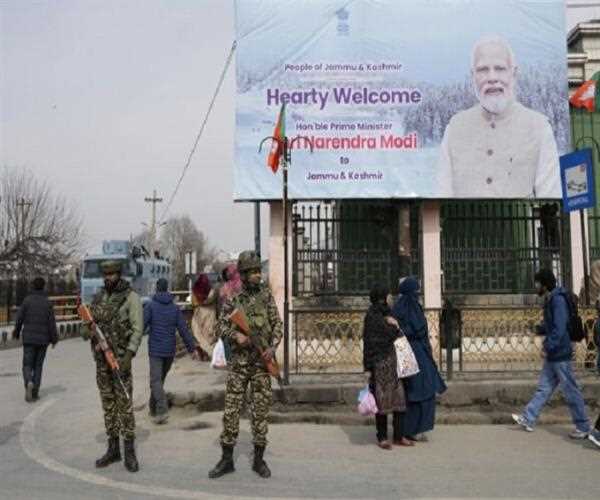
07-Mar-2024 , Updated on 3/7/2024 10:01:27 PM
When Modi visits Kashmir, what changes have you noticed in the region since 2019?
On Thursday, Indian Prime Minister Narendra Modi travelled to Kashmir for the first time since his administration controversially decided to revoke the region's special semi-autonomous status in 2019.
Speaking to a throng at a football stadium in Srinagar, the biggest city in the area, Modi asserted that peace and progress had arrived with the repeal of Article 370, which gave Indian-administered Jammu and Kashmir some autonomy.
"I am making a lot of effort to win your hearts, and I will keep trying to win your hearts," Modi declared, despite the fact that hundreds of troops and paramilitary personnel had been deployed and more checkpoints had been installed.
Though the Hindu nationalist movement, which Modi represents, applauded the 2019 decision, Kashmir, one of India's two Muslim-majority areas, which has experienced an armed uprising against Indian control for decades, was incensed.
Since then, on the brink of the 2024 national elections, Modi has travelled to the Jammu area, which has a large Hindu population, but he has avoided Kashmir.
Modi and his administration have argued that the removal of Article 370 and the actions that followed in Kashmir improved the situation in the area.
Here are some significant adjustments that the Modi administration has made to Kashmir since 2019:
With the exception of finance, defense, foreign affairs, and communications, Kashmir was granted a great deal of autonomy under Article 370 of the Indian constitution, which marked the region's special relationship with New Delhi. Kashmir also had its own flag and constitution.
The area controlled by Indians had its own prime minister until 1965, during which time regulations pertaining to property and domicile were enacted to safeguard the rights of the Indigenous population in the area.
But as time went on, the autonomy was diluted by succeeding Indian administrations, often leaving the area with less authority than other states within the country's federal system. Following the violent uprising that began in the late 1980s, the area has seen significant military presence.
The criminal code, the flag, and the constitutional safeguards of Kashmir were taken away with the repeal of Article 370 in 2019. Laws have been put in place in a number of Indian states to safeguard the tribal and Indigenous communities.
Kashmir doesn't anymore
The 2019 ruling was affirmed by the Indian Supreme Court in December 2023. For almost 75 years, Kashmir has been a significant source of tension between India and Pakistan, its neighbour. Although just a section of Kashmir is under their control, both nations fully claim the region.

Student
Join Our Newsletter
Subscribe to our newsletter to receive emails about new views posts, releases and updates.
Copyright 2010 - 2026 MindStick Software Pvt. Ltd. All Rights Reserved Privacy Policy | Terms & Conditions | Cookie Policy